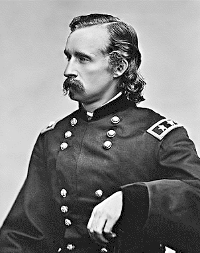On This Date In History
Did Custer Listen To His Scouts?
December 15, 2023
One of the claims that has been made about the Battle of the Little Bighorn is that Custer did not listen to his scouts. This has been provided as being one of the primary reasons why the 7th Cavalry lost the battle. What's more, this claim has become one of the prominent criticisms of Custer's leadership in regards to the battle. However, information has been discovered that tells a very different story regarding the matter.
In the early morning of June 25, 1876, Custer was in camp with the 7th Cavalry. They had been following a large Native American trail for days. The scouts were ahead.
While Custer was in camp that morning, he would receive word from his scouts that a Native American camp had been spotted from an elevated position. He would head toward that position.
Upon arriving at the location of his scouts, Custer would examine the valley of the Little Bighorn and then speak with his scouts.
One of the scouts who was present was an Arikara scout named Red Star. He would later speak about the discussion and relate the following.
- At one point in the discussion, Custer stated that he was not planning to take the regiment into the valley of the Little Bighorn that day.
- Later on in the discussion, Custer stated again that he was not planning to take the regiment into the valley of the Little Bighorn that day.
- Then, a Crow scout named Big Belly, as well as the other Crow scouts, told Custer that he should take the regiment into the valley of the Little Bighorn that day.
- Finally, Custer ended up saying to the Crow scouts: "Yes, it shall be done as you say" (Libby, 93).
The information provided by Red Star is rather incredible. It is incredible because it tells a very different story regarding the Battle of the Little Bighorn from what is sometimes told - it tells us that Custer did listen to his scouts. It also tells us that Custer listened to his scouts when making an incredibly important decision. In fact, Custer's decision to take the 7th Cavalry into the valley of the Little Bighorn that day could easily be considered to be one of the most important decisions he would make in regards to the battle. Thus, the fact that Custer changed his mind due to the urging of some of his scouts not only shows that he listened to his scouts, but that he did so in regards to a crucial matter.
The information provided by Red Star also conveys that Custer didn't just listen to his scouts, he went beyond listening - he did as they advised him. This is beyond mere listening.
Interestingly, the information provided by Red Star shows that Custer did the exact opposite of what he has been criticized for. While Custer has been criticized for not listening to his scouts, the information shows that he did listen to them.
The claim that Custer didn't listen to his scouts leading up to the Battle of the Little Bighorn has become an important part of the battle's story. It has become a crucial fixture on which narratives of the event have been built. What's more, it has become one of the prominent criticisms of Custer's leadership in regards to the battle. However, information provided by Red Star tells a very different story. It tells us that Custer did listen to his scouts. It also tells us that he not only listened to his scouts, but at one point, changed his plan, and did as they advised.
Due to the importance that has been placed on the idea that Custer didn't listen to his scouts, the information provided by Red Star becomes important as well. Further, since narratives of the battle and the man have been built upon this notion, both can be re-examined.
About the Author
Tim Kloos is an online advertising professional. He helps clients with their websites, online presence, and online advertising. If you need help with any of these, feel free to contact him via the contact page.
His tech website is clevelandwebdesignplus.com.
He has also written a children's book set in the Old West.
